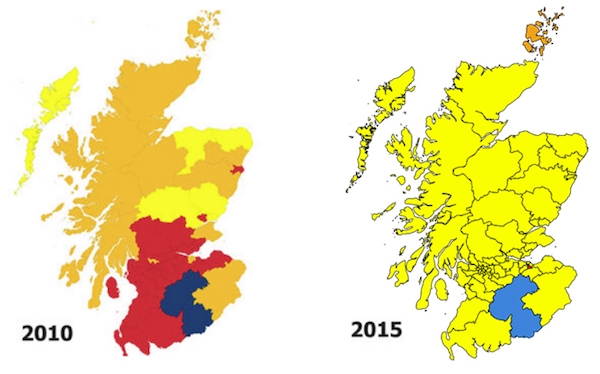Politics, as we know, makes the strangest of bedfellows. Step forward Tam Dalyell, Laird of The Binns and erstwhile Father of the House, and the editor of this estimable organ. In the space of this last week I have heard/read both sources refer to Scotland having a one-party state in the shape of the Scottish National Party; the former at Glasgow’s Aye Write! Book Festival and the latter in an editorial on Donald Trump. I would have expected better from both!
At the last count there were certainly a handful of countries to whom that description could properly be applied. North Korea and the People’s Republic of China spring to mind. Even for someone with my fertile imagination, I find it difficult to think of Nicola Sturgeon as a supreme leader in the mould of Kim Jong Un.
More pertinently, a one party state, by definition, is a legislature in which the voters have a single choice on the ballot paper. Scotland, in common with its neighbours in the UK, currently features eight contenders for ruling party in the Holyrood parliament: SNP, Labour, Conservative, Liberal Democrat, Greens, Ukip and the newest kid on the block, RISE, whose slate supports republicanism, independence, socialism and the environment.
No storm troopers attended RISE’s inaugural conference, and no stewards were harmed in the process of the recent Tory and Labour gatherings. The fact that Scotland’s eight police forces were merged into the singular Police Scotland, does not really qualify the nation for the title police state.
Yet there is a serious point to be made here. The phrase ‘one party state’ has been bandied about at will ever since the SNP took 95 per cent of the seats at the last UK general election. Voters returned just one Lib Dem, one Labour, and one Conservative MP out of 59 constituencies. I think it’s fair to say this state of affairs discombobulated many shiny new SNP MPs almost as much as their defeated opponents.
Many had finished in fourth place in previous elections. Some had never stood for office at all. A few had become attached to the SNP cause at a very late stage through the Independence Referendum. The villains of this piece – if villains you consider them – are the Scottish electorate who deserted their traditional political homes in droves.
This remarkable fluidity arrived on the back of the 2014 Referendum, but probably had its genesis many years earlier as those areas of Scotland serially represented by Labour MP’s failed to see any sight of the promised New Jerusalem.
The Labour cause wasn’t helped by the fact that their leadership seemed lately to have taken up residence in a revolving door. Since the death of inaugural First Minister Donald Dewar in 2001, no fewer than seven leaders have tried and failed to stem the Nationalist tide.
In 2007 the SNP led a minority government, and won outright in 2011. In the election this May, they are tipped to win perhaps all of the constituency seats, with the other parties targeting the regional lists which form the other component of Scotland’s additional member system of proportional representation. Should they indeed win a larger majority this will have a simple but not sinister cause: not enough people will have plighted their troth to the alternatives.
For those on the left unhappy at this state of affairs there are many reasons to be cheerful: Ukip barely registers a blip and the three main parties are all led by bright feisty women under 50. Personally, I call that a result.






Comments